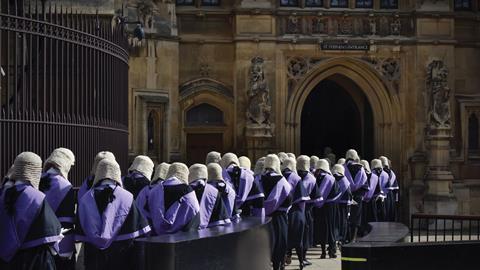State of the Union
Hardly a week goes by without confirmation that we are facing a judicial recruitment crisis. The most recent call for action was from the lord chief justice of England and Wales, Lord Burnett of Maldon, in a speech to a dinner for judges at the beginning of this month: ‘It is well-known that there has been difficulty in attracting applicants with the right skills to fill a variety of vacancies in recent years… For the fourth year in a row the Judicial Appointments Commission, despite its best and impressive endeavours, has been unable to recommend for appointment the number of judges needed to maintain the statutory complement [in the High Court]. We currently operate the High Court with only 93 judges, so 15 down.’

He drew attention to the inevitable consequences to the international position of the jurisdiction in England and Wales – particularly important as we prepare for Brexit – and the knock-on effect on professional services and the City. And he called on the professions to play their part in recruitment of their best and brightest.
But the Law Society could not do more to encourage solicitors to enter the judiciary. There is a section of its website devoted to prospective candidates. There are training workshops for solicitors focusing on competency criteria, how to navigate the selection process and how to complete the application form. The website contains helpful guidance and videos.
Despite this, the most recent judicial statistics show that there has been a 3% drop in the proportion of solicitor judges in the judiciary as a whole. Solicitors comprise the tiniest percentage of judges in the higher courts. We fare better as district and deputy district judges (74% and 70% respectively) and as tribunal judges and presidents – all at the lower end.
These figures look even worse when you compare them not just to two notional professions, but to the real numbers who are members of each profession. Solicitors vastly outnumber barristers. There are currently 142,286 practising solicitors in England and Wales. In 2017, there were just 16,435 practising barristers. In other words, the bar is little over one-tenth the size of our profession, but packs out the judiciary in quite disproportionate numbers.
I am not surprised. I have taken the judicial exam twice and failed on both occasions. The first time is too long ago to remember. The second was the memorable time when the Judicial Appointments Commission’s systems kept failing. But that was irrelevant. The written test consisted of a fast and nerve-racking examination of one’s skills in speed-reading and speed-writing under circumstances of great stress. The content was unfamiliar to me, despite it being an open recruitment. It would have been much more familiar to a practising barrister, who would have been at a considerable advantage as a result.
The JAC is apparently looking for evidence of intellectual ability, the ability to be fair and even-handed, an air of authority and advanced communications skills. These are clearly appropriate skills for a judge. But I do not think that the exam I took tested those skills at all. Since when did speed-reading and speed-writing under circumstances of great stress provide evidence of anything other than a facility to pass exams – which is quite different to being a good judge?
Nevertheless, it is acknowledged that the people who go on to become judges are of the highest quality. Our judiciary is rightly admired around the world for its excellence. So the JAC is picking good candidates. But at a time when there is a severe and damaging shortage of judges, and disproportionate numbers are entering from a tinier profession, it seems to me that the route to entry needs to be reconsidered.
I hasten to add that this is not a personal plea for my own candidacy to be reassessed. I have accepted the outcome. Nor am I considering here the impact on other minorities within the judiciary, such as women or candidates from black and minority ethnic backgrounds.
There is no perfect way to recruit anyone, whether it be employees in a firm or actors in a play. Interviews and exams each have their drawbacks, and there are not that many other options which keep within reasonable resource guidelines.
I think a written test is fine and I can understand that, when it is open to so many candidates at the same time via electronic means, the problems of cheating and plagiarism are difficult to control. But I would make a plea for a test which does not favour barristers in its content, nor examine speed-reading and speed-writing under circumstances of great stress. Rather, it should focus on the very skills that the JAC claims it is looking for: intellectual ability, the ability to be fair and even-handed, an air of authority and advanced communications skills.
Jonathan Goldsmith is Law Society Council member for EU matters and a former secretary general of the Council of Bars and Law Societies of Europe. All views expressed are personal and do not necessarily reflect the views of the Law Society Council




























8 Readers' comments